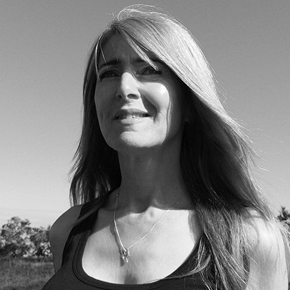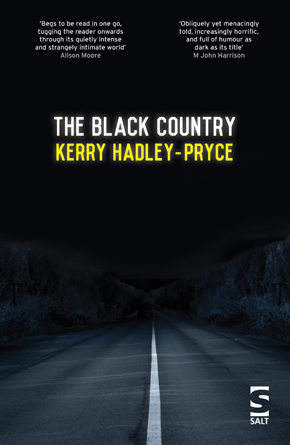All the wrong subjects
by Kerry Hadley-PryceI like to think I’m not one to hold a grudge, but listen to this: When I was at school, we had one meeting with a Careers Officer in year 10 (or, the fourth year, as we used to call it). As I remember it, she was a woman with big spectacles, a clipboard and no facial expression to speak of. She asked me one question, and that was what was I intending to do for a living. You know what I’m going to say. I’m going to say I told her I wanted to write, which I did. I wanted to write. After a long silence, she asked me the same question again. I told her I wanted to write. She checked my name on her clipboard, asked me to confirm it. I did. Then, still with absolutely no expression on her face, she told me I’d done “all the wrong subjects to be a writer.”
On the quiet, I still wrote. I wrote in thin-nibbed turquoise biro on unlined paper. I wrote anthologies of short stories – horror, mainly, or just plain weird. I rewrote fairy stories with a horrible, weird edge. I wrote a collection of poetry called Snakes which I illustrated with pictures of… snakes. And what was I doing on 16 August, 1977? I’ll tell you what I was doing. I was sixteen, sitting at the kitchen table, writing. It was 6 am, I had the radio on, I was writing a novel about a rock group and the lead singer was just about to disappear and then be found dead from a drug overdose. It was a crucial moment in my plot. Then the news about Elvis Presley dying interrupted the radio programme I was listening to. God’s honest truth. I remember wondering if that Careers Officer had been right. I mean, the King was dead, life was short, right? And I’d done all the wrong subjects.
So, all these wrong subjects I did have meant I have had many jobs. I’ve tried hairdressing, nursing, social work, recruitment, teaching. I’ve worked in offices – lots of offices – petrol stations, shops. I’ve sold coffee machines, advertising space, printing ink, cables and calibration services. I was a florist once. When asked why I have had so many jobs, I say something like, “Oh, you know, I’m inquisitive, I like a change, I’m interested in different things.” It’s not altogether a lie, and anyway it’s more difficult to shoot a moving target, I always think, plus I’m trying to convince myself I’m not one to hold a grudge. The basic issue is that I come from good working-class, Black Country stock, encouraged to get out there and work from an early age – not down the pit, or in the mill, or up a chimney or anything like that, just to get out and earn a living. At fourteen, I was catching the bus after school on Thursday and Friday afternoons to go and work in ‘Chris’s Hairdressers’, a converted semi in Brierley Hill. At fifteen I was working every school holiday and every Saturday at a shoe shop in Dudley, by seventeen I had my first full-time job at the offices of a steel rolling mill in Tipton, typing the same letter over and over again, reminding customers how much they owed and how important it was they paid quickly. And filing. Lots of filing. They called it the Credit Control Department. I hated that job. I really did. In fact, I hated most of my jobs. Teaching, I hated the most. Why am I telling you this? Because I like to think I’m not one to hold a grudge. And I tried. I really did. I tried not to write. Paul Auster said, “Writing is a solitary business. It takes over your life. In some sense, a writer has no life of his own. Even when he’s there, he’s not really there.” Hallelujah to that. I tried not to write because I’d taken all the wrong subjects, but it was like trying to suppress a tick, or trying not to laugh at the sound of a fart. You know you can’t not do it. I’m terrible. I know I’ve lied to people. A lot. I mean, I’ve told people I’m ill, but really, I’ve been at home, writing. I’ve let telephones at work ring, unanswered, bothered I might lose the thread of an idea I had. I’ve rescheduled and then cancelled meetings because I was writing something. I’ve agreed to do things, just to stop a conversation, so that I can get a piece of paper and a pen and get some writing down. I’ve given every impression of taking copious notes during meetings, but really, well, you know what I was doing.
I tried not to write because I’d taken all the wrong subjects, but it was like trying to suppress a tick, or trying not to laugh at the sound of a fart. You know you can’t not do it.”
Eventually I did a degree, as a mature student, and ended up a secondary school teacher. Quite quickly, though, something emerged in me that found teachers tiresome, and schools generally irritating places to be. I didn’t know what it was, exactly, that made me feel that way. I didn’t know what made me feel such resentment, such venom a lot of the time. There seemed to be a migraine round every corner. So I thought, I know, I’ll be an Educational Psychologist. That’ll take my mind off me and onto somebody else. I went back to university, studied Psychology. Let me tell you this: psychology was yet another wrong subject. When I received my first assignment back, the feedback (from a professor whose expertise was in rationality and logic) said “This is one of the most engagingly written essays I’ve read in a long time, but what it gains in style it loses in substance and I’m not sure you’ve grasped the concept at all. Have you ever tried writing fiction?”
So it was that I finally succumbed. I crumbled. I thought – realised – I needed an excuse to ‘come out’. How could I be an actual writer, I thought, if I keep taking all the wrong subjects? I needed an excuse, a reason, to actually write. And that’s what the MA at MMU did: it presented me with a reason to write, and the right subject. Creative Writing. I’ll be honest, I chose MMU because I could complete the course from home, online, but actually it’s one of only a few institutions requiring students to complete a full novel. I’d like to say I always knew what I’d write about and, you know, that the idea had been brewing in the back of my head since that time I had the meeting with the Careers Officer in year 10. But that would be a complete lie. In fact, the idea for The Black Country came to me in stages, and, I think, reflects how insular and intense I find the process of writing. I can recommend the act of walking (great advice given to me by my MMU lecturer, Nicholas Royle) for freeing up and untangling thoughts and ideas. I walked along the canal (the Black Country has an amazing network of canals) and felt the story of Maddie and Harry unfolding. I walked in the rain and weather through streets lined with terraced houses, and looked in, and saw lots of Maddies and Harrys and their secrets and lies evolving. I think because this area called the Black Country has its own culture, its own dialect. There’s a strangeness to the place, a weirdness in the air. It may not contain so many of its original dark, satanic mills – most of the industry has long since gone – but to me its bleakness and its ugliness, its wildness, really, inspired me to fix that setting and those characters together. On top of that, setting the novel in the area I live allowed me to totally absorb myself in the writing of it. Because of the way the story and the characters evolved, if an idea came to me, I’d try it out, see what Maddie might do, or Harry might say. I’d write it out like it was a tick I couldn’t control. I rejected as much as I ended up with – a lot of stuff about the way the chemistry between them changed. I let the idea of how holding a grudge against someone – a really big grudge, for a long, long time – and the idea of lying and holding back and secrets and just choosing the wrong person, taking all the wrong subjects, might colour a life. I liked all that. I wondered what a fairy-tale relationship might actually be like, or if it could exist. I looked at the canal water and thought about snakes and people disappearing and people dying. I realised that some grudges are worth keeping. Sometimes I felt exhausted.
When Salt Publishing said they’d publish it, at first, I thought I might have imagined it and kept it secret for a while. But now there’s no hiding place.
 Kerry Hadley-Pryce was born in Wordsley, in the heart of the Black Country. She completed her MA in Creative Writing at Manchester Metropolitan University in 2014, gaining a Distinction, and receiving The Michael Schmidt Prize for outstanding achievement. She is currently working on her second novel Broken Dolls, also set in her hometown. The Black Country is published by Salt. Read more.
Kerry Hadley-Pryce was born in Wordsley, in the heart of the Black Country. She completed her MA in Creative Writing at Manchester Metropolitan University in 2014, gaining a Distinction, and receiving The Michael Schmidt Prize for outstanding achievement. She is currently working on her second novel Broken Dolls, also set in her hometown. The Black Country is published by Salt. Read more.
The Prime Writers
@Kerry2001


